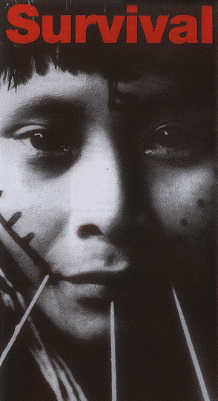Started in 1972,
Cultural Survival is a non-profit organization dedicated to defending “the
human rights and cultural autonomy of Indigenous people and oppressed ethnic
minorities” (www.cs.org). David
Maybury-Lewis, an anthropology professor at Harvard, formed this group
in Cambridge, Massachusetts. Cultural Survival is currently run in
affiliation with Harvard’s Weatherhead for International Affairs, an advocacy
and research group (data.fas.harvard.edu/cfia/pncs/index.htm).

Cultural Survival adheres to an “advocacy anthropology” philosophy (Sponsel 277). In the early seventies, anthropologists studying Indians began to feel that they had a responsibility of bringing the Indigenous plight to international attention. Starting with the Declaration of Barbados in 1971, anthropologists began to use their knowledge to promote basic human rights for Indians. Because Indians do not run Cultural Survival, critics sometimes question whether the organization is overly paternalistic
.
 |
Presently, Cultural Survival has many projects underway. They are active in Peru, Mexico, and Brazil, as well as several other third world countries. In Chiapas, Cultural Survival funds a project called Sna Jtz’lbajom, or Maya Writers Cooperative. Started in 1983, the program aims to revive traditional Mayan language through education, literature, and theater (www.cs.org). A second project was started in 1996 in Peru. With the goal of rejuvenating ancestral weavings, a well-known weaver named Nilda Callañaupa opened the Center for Traditional Textiles of Cusco. Through research and interaction with local weavers, the center promotes knowledge of Incan heritage (Callañaupa). |
For more information
on Cultural Survival, Click Here
Catch
a Ride Back to the First Page
Pachakut'i
Zapatistas
(EZLN)
Popular
Revolutionary Army
Shuar Federation
Confederation
of Indigenous Nationalities of Ecuador (CONAIE)
Coordination
Indigena de la Cuenca Amazonica (COICA)
Sandinista
National Liberation Front (FSLN)
Bibliography